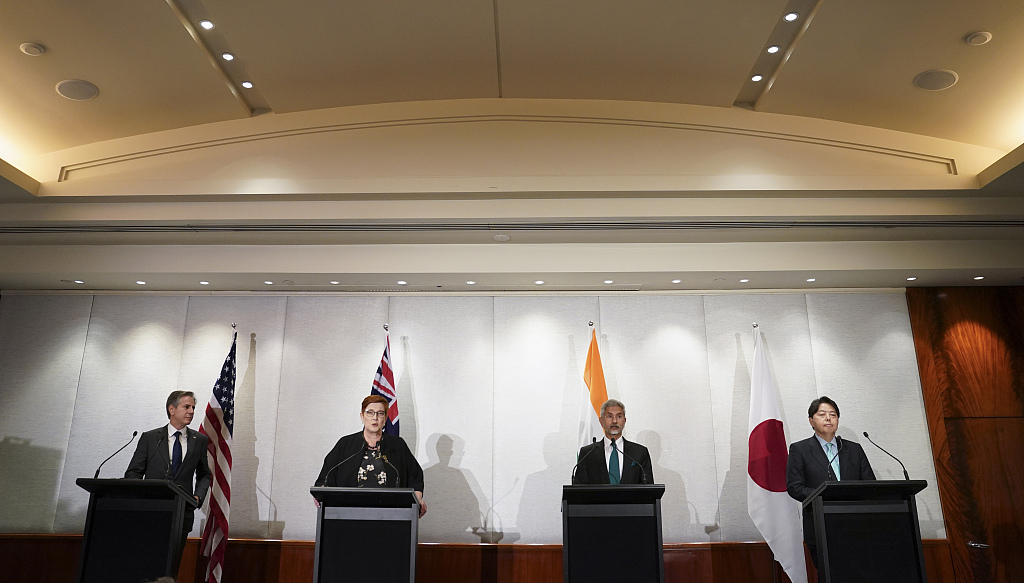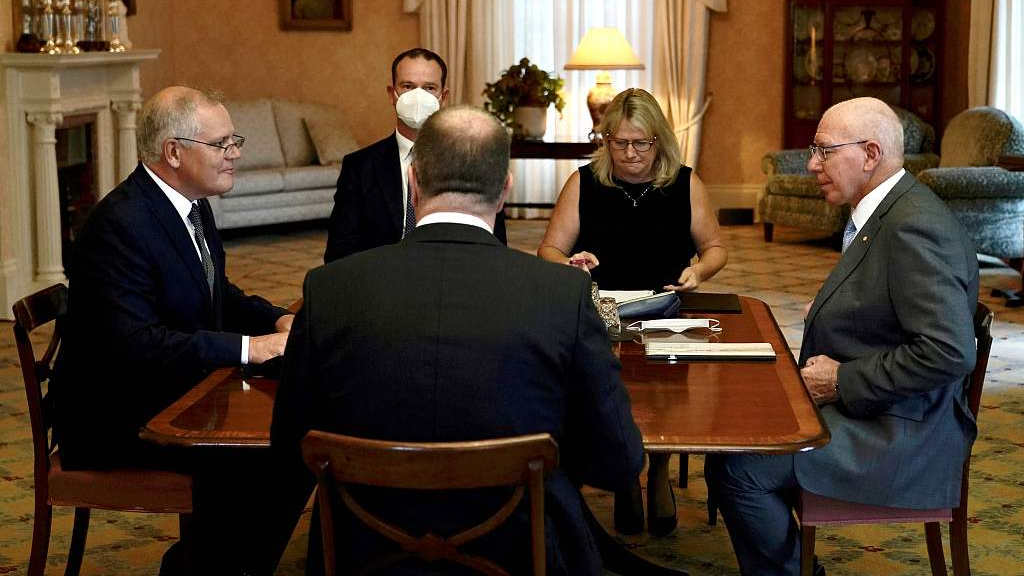
(L - R) U.S. Secretary of State Antony Blinken, Australian Foreign Minister Marise Payne, Indian Foreign Minister Subrahmanyam Jaishankar and Japanese Foreign Minister Yoshimasa Hayashi at a joint press conference at the Quad meeting of foreign ministers in Melbourne, Australia, February 11, 2022. /AP
(L - R) U.S. Secretary of State Antony Blinken, Australian Foreign Minister Marise Payne, Indian Foreign Minister Subrahmanyam Jaishankar and Japanese Foreign Minister Yoshimasa Hayashi at a joint press conference at the Quad meeting of foreign ministers in Melbourne, Australia, February 11, 2022. /AP
Editor's note: Daryl Guppy is an international financial technical analysis expert. He has provided a weekly Shanghai Index analysis for Chinese mainland media for more than a decade. Guppy appears regularly on CNBC Asia and is known as "The Chart Man." He is a national board member of the Australia China Business Council. The article reflects the author's opinions and not necessarily those of CGTN.
Australian Prime Minister Scott Morrison and Defence Minister Peter Dutton have demanded that China condemn the Russian attack on Ukraine. "I particularly have been concerned at the lack of a strong response from China," Morrison said. Dutton said Chinese President Xi Jinping should call Russian President Vladimir Putin and tell him the military operation was "a terrible mistake."
If you call out one country for a failure to act then you have a moral obligation to call out other countries that are following the same path, irrespective of their status within any so-called like-minded alliance. China, and two American allies, India and the United Arab Emirates abstained from the United Nations Security Council vote but Australia has only criticized China.
Australian political leaders have not criticized Indian Prime Minister Narendra Modi who has not joined with the West in condemning the Russian invasion. Like Xi, Modi has urged an end to the violence. Unlike Xi, Modi has not offered to assist with mediation between Ukraine and Russia.
There are two issues raised by Australia's lack of consistency. The first relates to the way Australia's foreign policy is shaped. The second issue relates to the viability of the Quad agreement which includes Australia, the United States, Japan and India.
Foreign policy is either a sovereign policy, or subordinated to the foreign policy of another country. This selective call-out by Australian leaders is the difference between following the lead set by others and the application of a truly independent foreign policy. This is the difference between surrendering sovereignty over foreign policy and asserting a sovereign foreign policy.
The reason for the discrepancy of approaches lies with Australia's reluctance to adopt and apply an independent approach to foreign policy. A foreign policy approach that is independent allows Australia to assert its own sovereignty and make decisions that support its allies, but which are not carbon copies of policy promoted by others in the service of their own interests.

Australia's Prime Minister Scott Morrison (L) attending an executive council meeting to sign off on sanctions imposed on Russia, at Admiralty House in Sydney, Australia, February 24, 2022. /VCG
Australia's Prime Minister Scott Morrison (L) attending an executive council meeting to sign off on sanctions imposed on Russia, at Admiralty House in Sydney, Australia, February 24, 2022. /VCG
When foreign policy is not sovereign and independent, it means that the exercise of critical and balanced judgement is constrained by the need to adhere to policy announcements made by others, and in particular to those made by the United States.
It means Australia criticizes China but does not criticize India when both countries have the same response. It's a double standard approach that does not go un-noticed by others in the Indo Pacific region. It undermines Australia's credibility.
This foreign policy dependency means that it will come as no surprise if in the coming weeks the U.S. calls out India and Australia quickly follows.
However, the real issue here is not with who is, or is not, loudly condemning Russia. The second issue of concern is about what the actions of India say about the validity and viability of the Quad agreement which comprises Australia, the U.S., Japan and India. More than any other recent event, the Russian military action in Ukraine has exposed the fundamental contradictions and weakness of the Quad alliance.
Stresses in the Quad were always found at a practical operational level. India relies on Russia for much of its military equipment and technology. This includes Russian warships for the Indian navy, Russian aircraft for the Indian air force and a vast array of Russian missiles and military equipment for the Indian Army. In recent weeks, India has signed several new deals with Russia for new military equipment.
It was always impolite to question just how India's defense pack was going to be compatible with Australian and Japanese defense systems, which are based mainly on American technology and weapons support system technology.
Now it has become a different question because of the sanctions imposed on Russia by the United States. Just how India will manage these defense deals with Russia if U.S.-led sanctions are applied to both trade deals and trade settlement is an unanswered question. Financial settlement may be blocked and secondary sanctions may be applied to countries like India that continue to trade with Russia.
The three other members of the Quad cannot make a special exemption for India. If they do make an exemption and allow India to continue military trade with Russia, then the credibility of the Quad is shattered. If they do not make an exemption, then the Quad is reduced to three members for all practical purposes of defense cooperation.
Keeping the Quad intact will take more than a hypocritical refusal to call out India for not condemning the Russian attack. India's ongoing defense deals and reliance on Russian military equipment create a fundamental tension that splits Quad partners and limits the impact of this new and increasingly unworkable alliance.
(If you want to contribute and have specific expertise, please contact us at opinions@cgtn.com.)

